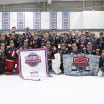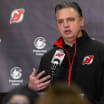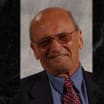In May of 2015, when the newly named general manager of the New Jersey Devils, Ray Shero, received permission from Jim Rutherford, the general manager of the Pittsburgh Penguins, to speak with their assistant general manager, Tom Fitzgerald, Shero thought the interview that would follow was a mere formality.
"I thought this was going to be a slam dunk," Shero said. "He was the captain when I was [assistant general manager] in Nashville. I gave him his first job in management in Pittsburgh and brought him up through the ranks. Why wouldn't he want to work with me? But when he came to meet with me, I realized real quick it wasn't a slam dunk at all."
As a player, Fitzgerald was known, above all else, as a competitor. He prided himself on being one of the toughest players to go up against night in and night out and strived to improve every season. After being drafted 17th overall in 1986, it's that work ethic and mentality that enabled him to play 17 seasons in the NHL for seven different teams, including two who selected them in their respective expansion drafts - Florida and Nashville - while averaging just 20 points a season.
When he transitioned into management in 2007 as the Director of Player Development for the Penguins, his work ethic and competitive spirit didn't disappear. Not only did he still want to do everything he could to help his team win, but he also wanted to grow and be challenged in his new role. Just as he worked hard to grow and be challenged as a player to reach the highest level, his new goal was to reach the highest level in management.
When Shero reached out to Fitzgerald about coming to New Jersey, it wasn't just about having the opportunity to work with a man he respected and had an outstanding previous relationship with. It was also about how this position could grow him as a member of management and prepare him for the opportunity to become an NHL GM someday.
"Looking back on it, I shouldn't have expected anything less," said Shero of the intense three hour meeting he had with Fitzgerald, where he had to sell him on the organization, the ownership and his expanded responsibilities as assistant general manager of the Devils. "He's a competitive guy who is extremely thorough in his research. The due diligence he took while making sure this was the right career move and opportunity for him is exactly the due diligence I saw from every management decision he made in Pittsburgh and why I wanted him on my team."



















